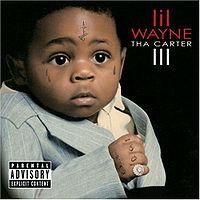
Lil Wayne
Tha Carter III (2008)
Jordan Rogowski
Meet Dwayne Carter.
The man who, by most accounts, is supposed to be the savior of hip-hop.
That's a mighty weight on the shoulders of the man from New Orleans. While Nas makes albums about how hip-hop is dead and Joe Budden is indicting everyone responsible, the self-proclaimed best rapper alive spends his days, nights and holidays in the studio. If nothing else could be said about the man they call Lil Wayne, it's that he's got an undeniable passion. A passion for hip-hop, a passion for music -- a passion for creating.
With all of this comes scrutiny, and expectation. And with every pushed-back release date of Tha Carter III, the scrutiny and expectation grew. So is this latest edition of The Carter the classic the hip-hop world was pining for?
In short, no. Wayne's inability to produce a classic with Tha Carter III can be directly correlated to his two greatest assets as an artist: ambition and creativity. Weezy F. Baby injects an unabashedly creative spirit to everything from his lyrics and flow to beat selection. No major label hip-hop release in 2008 takes more chances. Some of those chances hit the mark and hit it directly, while others will leave listeners wondering.
The good news is that more songs hit the mark than not, and that's because Wayne knows enough to start with his bread and butter. The metaphors and slick punchlines that have garnered myraid accolades are front and center on "Mr. Carter," a laid-back exercise in wit that features the other Carter. Sean, that is, or Jay-Z, as he's widely known. The two heavy-hitters trade bars, but it's the hip-hop veteran and Jay-Z that shows Wayne up with witty lines and complicated rhymes schemes ("I'm far from be-ing the bas-tard that Marcy had fathered, Now my name's being mentioned with the martyrs / The Biggies and the Pacs and the Marleys and the Marcuses / Garvey, got me / A molotov cocktail, flow even if you box well").
Following Hov is a monstrous task, but Wayne attempts with the puzzlingly popular "A Milli" and the T-Pain-assisted club smash "Got Money." The latter combines a thumping beat and T-Pain's Auto-Tune for a fun four minutes that'll be stuck in your head for weeks.
That's all expected from Wayne, though. Where he starts to deviate is the clever "Dr. Carter," a track that sees the gravely-voiced emcee narrate a blow-by-blow account of somebody trying to save hip-hop from the literal operating table. Then the course changes again. "Tie My Hands" is the first of consecutive Kanye-produced tracks to use low-key, uncharacteristic production. Above the delicate sounds of acoustic guitar and a quiet drum loop the content is decidedly somber; Hurricane Katrina is the subject, one that hits close to home for a man who lives in the flood-ravaged city.
I lost everything, but I ain't the only one / First came the hurricane, then the morning sun / Excuse me if I'm on one, and don't trip if I light one / I walk a tight one, they try to tell me keep my eyes open / My whole city under water, some people still floatin' / And they wonder why black people still votin', cause your president's still chokin' / Take away the football team, the basketball team / Now all we got is me to represent New Orleans / No governor no help from the mayor, just a steady beatin' heart, and a wish and a prayer."
On "Shoot Me Down," Wayne slows his flow to perfectly match the hollow, brooding production, and on "Playin' with Fire," he sounds positively manic. Throwing any semblance of structure out the window, he lets his ego get the better of him ("And you know what they say, when you're great it's not murder, it's assassinate / So assassinate me bitch, 'cause I'm doin' the same shit Martin Luther King did"), but even then, the originality of his approach makes it all all right. Rounding out the best stretch of the 16-song album is the smash "Lollipop," and though detractors will contest that Wayne overuses Auto-Tune and doesn't really rap on the song, those same people are unable to explain why that's an inherently bad thing. The slow, twinkling groove is almost hypnotizing and Weezy's southern drawl is a flawless accent. Though it's a heavily criticized song, it's a perfect illustration of how Wayne will take chances that other rappers simply would not.
Not every such idea was a sure shot, however.
The odd, ET-themed "Phone Home" is well produced thanks to David Banner, but the cries of "phone home" in the chorus sound far too similar to "Mike Jones" and, even by Wayne's standards, the lyrics are near incomprehensible. "La La"'s baby-like noises are too much of a distraction to even try to listen to Wayne or guests Busta Rhymes and Brisco. He also gets shown up on his own track again by Fabulous (first time being "Six Minutes of Death") and Juelz Santana ("No Other") during "Nothing on Me."
Missteps aside, Tha Carter III asserts Lil Wayne as one of the most creative and talented voices in hip-hop. Whether he has the capacity to expound on that is a story that Tha Carter IV is just itching to tell.